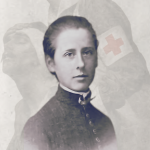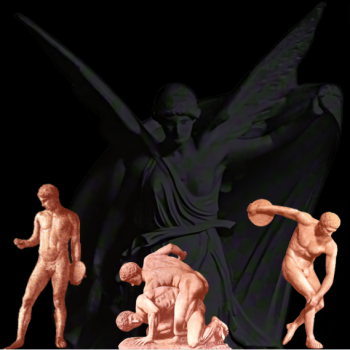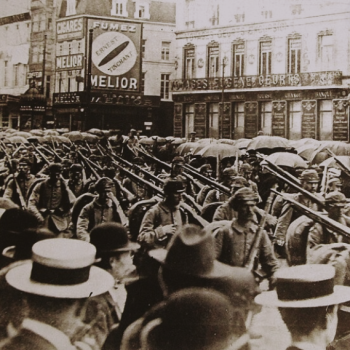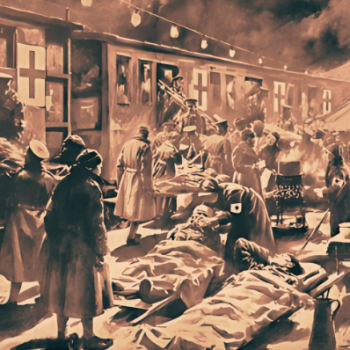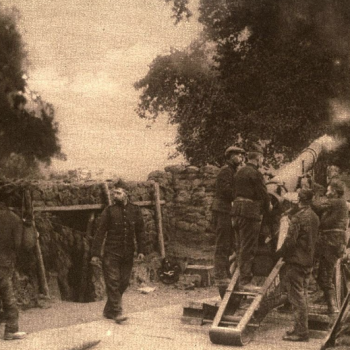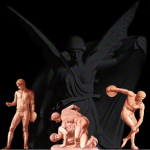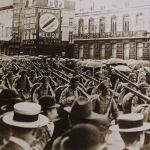PART II
IT’S WAR
It is with a peculiar reticence, difficult perhaps to explain, that many of us who took part in the War speak of it and of our own War experiences, although very probably few of us have memories which are more tragically dear. To those of us who passed through it (even those who, like myself, played such very insignificant roles,) the world still continues largely to be divided into two parts—those who were “in it” and those who were not. This is not said with any sense of voluntary withdrawal, but because, if one must speak of it at all, one asks: “Where shall I begin? How can I ever end? And can I do even faint justice to so noble and great a theme?” Sir Philip Gibbs, attempting a narration to non-combatants who had not yet glimpsed war, of his experiences at the front, of what he had seen and shared, said: “but it was only a few who understood.” This was at the end of the first nine months. Of course, thousands of people, millions rather, have been added since that first year to those who did see and share, and who therefore understand; yet there are still too many to whom the Great War has become recorded history only, rather than the memory of intense life lived from day to day through those four crowded and immortal years. To some of us the experiences of those years are as though they had happened but yesterday—they are scarcely even memories, so persistently present are they. When we look back and think of boys, still in their first youth, with great ragged wounds, dying in our arms; or of women and children, hunted like animals, fleeing for their lives, overtaken and subjected to unspeakable outrages worse than death—to write of this is only adding one more chapter to the countless chapters which have already been written, and will the speaking again of that time make it more living? It seems incredible that the vividness of those days could ever grow dim; that there should be a necessity for recalling them, even to those who took no active part. Why are they not continually present with us all? Not the blood and the filth and the unspeakable weariness—these were, after all, small matters—but the majesty of it, the indescribable heroism of those who gave their uttermost. We remember those splendid men and women who answered the Great Call, and we turn away in shame and disgust at the pettiness of much that is in our lives today. Did they care whether they lived or died, so they could serve? Did they care who would be first or last, prominent or obscure? There was no first or last among those who gave their all. In war there are no inequalities among those who give all they have to give, and it is that self-giving which is the initiation into the brotherhood of soldiers. Those who did not give all they had, simply never took part in the War at all in any real or lasting sense. That self-giving was spontaneous with some, it had to be learned by others, but if it did not come sooner or later, the War, and the War’s deeper significance, remained a sealed book. If one had never seen whole-hearted sacrifice, one found it at last in the men who lived month after month in the trenches, thinking only of how they could give more, not less; among the stretcher bearers or those who drove ambulances under constant and deadly shell fire; among the women in field and base hospitals, where, tenderly, and under the most terrific strain and danger, they nursed the sorely wounded back to life, or, more tenderly still, closed their eyes when they died. I can claim no part whatever in such great and noble deeds, but I have watched them, and the splendor of them still shines into my heart, and always will. Must we then be forced to remember our silent dead? Is it possible to forget those who are still living—a living death? Those who are hopeless paralytics; those still crazed by shell-shock, or whose lungs are slowly rotting from the gas which Germany first used; those who are sightless; yes, those who have had their very faces shot away—what must they say to our ingratitude? Why should we have to write of these things again since we all know them? Yet there would seem to be the need, “lest we forget”— not the true War veterans, they never can forget; but for those to whom that magnificent conflict has begun to fade into vague and shadowy dreams.
When one attempts to write about one’s own War experiences, one is instantly faced by a peculiar state of mind—what was actually my own personal experience, and what has become so living to me that I think I saw it and took part in it? Many post-War writers have drawn attention to this phenomenon; I suppose, therefore, it is not an unusual one, but it is sometimes rather embarrassing if one is trying to record facts observed by oneself. With that strange blending of consciousness which was experienced at times by many of us during the War, who shall say that there was any real separation? A brother’s peril was one’s own; what he lived and suffered, one lived and suffered with him, and in moments of great danger the feeling of comradeship was so intense, our senses were so miraculously raised to unaccustomed heights, that many of us experienced “that release from the chains of ordinary life,” of which Through The Gates of Gold speaks.[1] “That you actually feel your own physical wound is a weakness of your limitation. The man who is developed psychically feels the wound of another as keenly as his own.” This is but another way of explaining that strange state spoken of by post-War writers, and it was not as uncommon as the lethargy of peace conditions would try to persuade us. Yet the adventures of any one person are necessarily limited when gauged by the colossal dimensions of the World War, and in my own case they will, of necessity, be so especially. At least they have the advantage of being personal, however, and as such these “Memories” are written down.
~
The question: Who started it?—that question which appears to be troubling some strange people in these post-War years—did not trouble us at all. It never even occurred to any of us to ask it: how could it? Austria had declared war on Serbia; Germany had declared war on Russia, and had invaded both France and Belgium. Therefore, those of us having the good fortune to be on hand when the first gun was fired, thanked that good fortune that we were there, and we simply enrolled ourselves, both outwardly and interiorly, as soldiers in our splendid cause, volunteering for active service in any capacity whatever, if only we might serve; volunteering, each under his own flag, whether that flag were inherited by birth, or, as in my case (being an American and therefore, alas, that unfortunate thing technically known as a “neutral”) whole-heartedly adopted.

The first page of the edition of the Domenica del Corriere, an Italian paper, with a drawing by Achille Beltrame depicting Gavrilo Princip killing Archduke Franz Ferdinand of Austria in Sarajevo. (Source: Wiki)
No use to retrace historical steps, or to follow the onward march of events between Fashoda and “the thirteen days,” for in order to gain any moral light, it would mean going back at least as far as that picturesque African episode. No use even starting with the Sarajevo crime in June of that year of years, 1914. Are there not histories—mountains of them? And do they not tell, each according to its own understanding, the rights and wrongs of the gigantic issue?
In one sense, we in England had not been allowed by circumstances to become wholly deaf to “wars and rumors of wars,” but it was civil war that we feared, and few of us, at that time, paid much attention to the troubles abroad. I believe it can safely be said that up to the third week of July the best of our attention was given to the unhappy Irish question, and we seemed to have no eyes or ears for the great world across the Channel. The Home Rule Bill ruled the public mind, and the press was full of editorials and letters in favor of a “larger Ulster” or the reverse, as the case might be. We read about gun-running and its inevitable and tragic sequels. What would it lead to? The South and the West, while entertaining the greatest hostility to the North, appeared, none the less, to look upon the Ulster Volunteer Movement with a smile or a sneer. “One Catholic is the equal of ten Orangemen,” it was maintained with a sarcastic shrug, and the Nationalist “Molly Maguires” were paraded as more than a match for any number of Northern Unionists, however well-armed they might be. We read too, of the Conferences at Buckingham Palace; of the efforts of the King to pour oil on the troubled waters; of the attacks of radical newspapers on the King in consequence; of Mr. Asquith’s immediate and scornful reply to these attacks; of Mr. John Redmond’s demands and threats; of Sir Edward Carson’s protests; of the final breakdown of the Conferences—and meanwhile the horrors of civil war continued to stare us in the face. In France, L’Affaire Caillaux was all that most people seemed to talk or think of, though certainly the Quai d’Orsay was far more aware of the cloud in the East than was Downing Street. Russia, somewhat enigmatic, while wrestling with her labor riots, kept a sharp eye on the Balkan situation, as well she might, for it was considered that the Austro-Hungarian demands on Serbia were an indirect, but none the less purposed challenge to her interests there.
The ever memorable “thirteen days,” preceded as they had been by nearly a month of comparative if somewhat ominous European calm, began, as all the world knows, with the Austrian Ultimatum on [July 23, 1914.] Such an ultimatum had, until that time, never been heard of. The delicate balance of European power, already wavering in its equilibrium, was dangerously disturbed, and we entered upon those “ thirteen days” (though we did not then know them as such) wondering what the outcome would be. Never had the morning newspapers been so slow in reaching us; never had diplomacy appeared so halting and so shrouded— though, as a matter of fact, I think that many of us find it somewhat difficult to remember what were at that time “open secrets,” and what has since been learned and fixed into its chronological place by a later adjustment. Though the times were troublous, however, few of us seemed willing to believe that anything so cataclysmic as a vast European war could actually overtake us, and as late as the very last days of July (one might even say August 1st,) most of us still clung boldly to our illusions, through the ups and downs of the tidings which reached us. Such an interlarding of good and bad news, of local and general! Side by side with the news of the Serbian reply to the Austro-Hungarian Note, came reports of the Dublin riots, causing us the greatest uneasiness; but the very next day we were told that the European situation was “perceptibly less threatening than it had been yesterday,” and of course our confidence reasserted itself with all the greater assurance because of the recent depression. On the 28th, however, Austria had declared war upon Serbia, the most fearful danger threatened the whole of Europe, and urgent appeals were made in the English press to Irish loyalty. “ Close the ranks, close the ranks!” was the call; “In the face of disaster let us stand together.” So our hopes fell and rose, only to fall again.
Scenes of great excitement had been reported from Paris when the Serbian reply was made public. The usual Saturday evening military bands, marching through the streets, were cheered with unwonted enthusiasm by the strolling crowds. This stirred the indignation of an errant group of young Syndicalists who, setting up a protesting shout of: “A bas les trois ans!” were instantly mobbed by patriotic onlookers, shouting in their turn: “Vive la France! Vive l’Armée!” The German Ambassador, Baron von Schôn, calling at the Quai d’Orsay, increased the general apprehension by his famous “ communication” which, to many Frenchmen, appeared to be a repetition of the Agadir coup. President Poincaré and the Prime Minister, Viviani, were with the French Fleet, and there appeared to be some difficulty in maintaining uninterrupted communication with them. The utmost pessimism prevailed, and troops were sent to reinforce the frontiers.
In Russia, mobilization was rapidly going forward; the Austro-Russian tension increased hourly, ending in diplomatic suspension ; and there was reported to be a concentration of Russian military forces on the Austrian frontier. In Belgium, precautionary measures had been started; soldiers on leave were recalled, and a general mobilization was being considered, while the forts of Liège and Namur were being placed on a war footing.
Precautionary measures had also been begun in England, the Admiralty issuing orders to the First, Second and Third Fleets to be in readiness in case of need. Day by day the situation grew darker; Europe was rapidly arming, France and Russia continued to strengthen their frontiers; little Belgium, mustering all her forces, determined to defend her neutrality, while Germany—well no one was quite sure, by this time, what was going on there! Yet, while all the world seemed bristling with war preparations, there were still many of us who did not think that war was inevitable. Surely it could be averted, even at the eleventh hour. There might be hot words and threats, Austria would of course have her revenge on Serbia, but war would be confined to a small spot in the far East, and Europe in general would cool down. So we, who had no political wisdom, argued, the wish being father to the thought.
I was in Cornwall with a little party of friends during this time, taking a much needed holiday, for I had been working rather hard in London (where I had been living most of the time since leaving Germany) all through the winter and spring. It was a tiny and very primitive little place on the South coast that we had settled in, some distance east of Falmouth, and with a long drive between us and Truro, where we connected with the nearest railway. News was slow in reaching us, and in that secluded spot the mere idea of a World War seemed even more remote than we ourselves were from civilization. That is why war actually burst upon us, in our quiet retreat, before we were fairly awake to the fact that war was even more than likely. For this same reason, when August 2nd came (August 2nd, which we now remember and speak of as “Black Sunday”) with Bank Holiday, August 3rd, following on its heels, our newspapers were so much delayed that we did not know until some twenty-four hours later that Germany had declared war upon Russia, had invaded France at Cirey without any declaration of war at all, and had crossed the frontier into neutral Luxemburg. Even then we thought matters might be “patched up,” incredible as it seems; we were still living in the illusions prevalent on August 1st. To reinforce our somewhat waning hopes, we read with satisfaction that Italy would give no support to the Triple Alliance, which applied only to a defensive war, and Italy did not consider this to be such.
It was on Tuesday, August 5th, that we knew beyond question what the situation really was, and what England had decided to do. I sometimes wonder if the “ end of all things” will overtake us as suddenly and as silently as the World War did. The memory of that day is branded so deep that some of us find difficulty in speaking of it, even after all these years. It was a fine, breezy morning, and with one of my friends and her two children, I had started for an early walk along the rim of those magnificent, rugged bluffs overlooking the sea—the glory of Cornwall. As we turned homeward, we saw in the distance the lonely figure of a man walking rapidly toward us. On he came. “Why it’s Daddy!” cried one of the children delightedly, and they both ran forward to meet him, as he approached. We saw him stoop and lift the little one up on his shoulder, giving his hand to the other, as he still strode on. Within a few yards of us he stopped, and sent the children chasing a rabbit which dashed past at that moment, bounding joyously through the low, sweet heather, and he came on alone. He held a crumpled telegram in one hand, and his face was like carved marble, but there was a fire in his eyes that I have always been glad I saw.
“Well, its war!” was all he said, looking at his wife. She did not need to be told anymore; she knew the rest.
“How soon are you going?” she asked, quietly, steadily.
“Now,” he answered, in an even tone. “Will you come back to the Inn with me and help me pack? Goodbye,” he continued, turning to me. “May we leave the kiddies with you for a bit, and would you mind bringing them home—by and by?”
The children had run up, just then, and were tugging at his coat, eager to tell him about the rabbit. He kissed each one of them tenderly, and then, with his wife beside him, he walked silently away—they were both very young, and life was dear. As they came to a dip in the cliffs which would hide them from us, he turned for a moment, and waved. I never saw him again—so swiftly and so simply does an old world pass away. He went out to France at the earliest opportunity, and gave his own life for the life of a wounded comrade.
Later in the day I too packed my bags, intending to go up to London to offer my services. I did not yet know in what capacity, but that seemed to make little difference just then. To my dismay, I found that I was no better than a prisoner on that tiny spot of earth; that the Government, immediately war had been declared at eleven o’clock the night before, had taken full control of the railways of Great Britain, and that all trains, for a day or two at least, were to be used for the transport of troops, stores and food supplies only. I confess that I felt like a caged animal, and the day dragged itself out interminably; but of course, like everyone else caught napping, I had to make the best of things. As it turned out, however, I did not need to wait till I got up to London to have my first, if comparatively mild glimpse of war conditions, for after dark when, alone, I stole out into the soft Cornish night, and down to the beach not far from the small Inn where we were stopping—the beach where only the night before we had all sat happily watching the stars come out, and listening to the soft wash of the waves—there, to my great surprise, a short distance from the shore, a battleship lay, a huge, black mass, grim and silent. The home waters were being well protected by the Navy. One wondered how she had crept up so stealthily, for, an hour or so before, she had not been there, and as I looked and thought of what it signified to have a solitary battleship standing like that, close in to shore, I became aware of something else which made my pulse beat quicker. As though he had suddenly sprung from the very sands themselves, close to the water’s edge, black and sharply silhouetted against the clear, grey silver of the sea, came marching the lonely coast-guard, erect and alert, in full service kit, rifle on shoulder— I could see the sharp outline of the barrel as he moved. Now one knew that war had really come, and that over there, across the waters, lay France, and battle-fields, and burning villages, and dying men.
Turning home again, I passed in unnoticed at the little entrance gate, and walked through the silent garden, across the dewy lawn, past groups of great white dahlias shining like silver lamps in the summer darkness; the roses with a poignant fragrance scenting the still evening air, as though their sweetness were being pressed from their very hearts by the dark hours through which they were passing. But all this loveliness belonged to the old world which was gone—and gone so swiftly—for out there lay the great battleship, and not far away that lonely coast-guard watched and listened; and just across the Channel, France (the France we knew so well and loved) was fighting for her life.
I was able to get up to London some forty-eight hours later, and on the way became well aware that we were indeed irrevocably at war, for all the railway lines were closely guarded, especially at vulnerable places, and at many points we passed detachments of British soldiers, massed close to the lines, evidently waiting entrainment. Reaching town, I found a transformation which had taken place, as it were, overnight. It was literally bristling with war preparations, and looked curiously unfamiliar; yet strangely enough, one felt that one was seeing, perhaps for the first time, the real community, as we may view an old friend suddenly wakened from the comfortable lethargy of ordinary, daily life, exalted, and on the eve of a great sacrifice, when we recognize that we are now seeing the real man, hitherto but dimly felt behind all the veils of the personality— the real man, the real friend whom we have always loved. When I had left London three weeks before, it had been in normal condition, with its endless streams of taxis, busses, delivery wagons drawn by sturdy, well-fed horses, and all the other familiar home sights. Now it was like an armed camp, largely khaki hued, where before it had been drab grays and blacks; unimaginably busy and electric. One of London’s charms before the War, was its repose, its ease; but with the 4th of August one may say that the old-time quiet and deliberate calm passed away, never, perhaps, to return; and in the weeks that followed, while I was looking for my “chance,” I often had to stop and collect my wits in order to assure myself that I was still living and moving in the old, lately familiar and dear haunts, for now, day and night, day and night, troops were marching through the streets. Often through the dark hours one heard them pass. Oh, the sound of marching men in the night! Can anyone who has heard it, in hours of danger, ever forget it? In the great parks and gardens, where formerly there had been strolling, leisurely crowds, one now saw soldiers in full campaigning kit; station platforms were filled with them, sometimes resting, their rifles stacked, while they waited further orders. In many of the squares and open spaces, raw recruits, without uniforms and carrying dummy rifles, were receiving their first instructions and their first drilling. In other open spaces, quantities of gun carriages were massed, ready for transport. Motor cycles, with their dispatch riders, dashed noisily to and fro; military cars, with important looking occupants, came from all directions, and drew all eyes. Carrier’s carts, with their old legends still betraying their late owners and their legitimate employment, were driven through the streets, metamorphosed into ammunition wagons. Bow Street had issued warrants authorizing the military authorities to seize motor cars, horses—anything which was likely to be of use to the Army, and the requisitioning of horses, especially, had its humorous side, for the astonishment of the driver, swiftly and unceremoniously relieved of his horse, and sometimes left, whip in hand, still perched high up on the seat, was most amusing. Any well-conditioned horses, strong and fit for army use, were liable to find themselves transformed in the wink of an eye, from private “drays” into Government servants. Carter Paterson, that friend of all householders, is said to have furnished in those first days of the War a great quantity of horses which were shipped to Southampton forthwith, on their way to France and Belgium. Hospitals were being started everywhere, and travelers were swarming back from Germany with tales of hair-breadth escapes.
Whitehall was one of the most interesting sights in London. From Trafalgar Square to the Houses of Parliament it was a seething mass of humanity, crowds so thick that you wondered where all the people had come from, and if the rest of the London area had been emptied in order to furnish these crowds. At the entrance to Downing Street one could hardly push one’s way through; in front of the Admiralty and the War Office it was a solid wall—particularly did the War Office seem to attract the crowds. There was a reason for this, for after the temporary easing of the Irish situation, there were two things in those early days which, I think, heartened us all more, even, than we guessed at the time—the splendid and generous response of the Dominions to the call of the Mother country: “When Britain is at war, we are at war” they declared; and the last minute recall of Lord Kitchener for home duty just as he was leaving England to return to his post in Egypt. I think the whole of the British Empire gave a deep sigh of relief when they knew him to be installed at the War Office, when they knew that he was at the helm; for even the severest of his critics had to admit that there was no one who gave to the public mind such a sense of security, while, at the same time, firing the public imagination as “K. of K.” (Kitchener of Khartoum) did. Whatever he said brought conviction; whatever he asked met with instant response. Thus, while at first many people declared that “the War would be short and bloody, and over by Christmas,” there were always those who retorted: “Kitchener says it will last three years—and he knows if anyone does.” And when his first “call to arms” rang out, when he asked for the first hundred thousand men, the response was beyond all expectation, and was a conclusive proof not only of what he himself could accomplish, but also of Great Britain’s appreciation of him. Great Scotland Yard, the headquarters of the London Recruiting District, was invaded as soon as war was declared, and within forty-eight hours, if I remember correctly, divisional recruiting stations had to be opened in many parts of London, and, of course, in the provinces. There were steady streams of applicants; crowds of men in all walks of life gathered outside every recruiting office as quickly as it was installed, and in some cases the volunteers were so persistent and so eager, that mounted police had to be called up to hold them in check. It was reported that the army recruiting authorities found it necessary to keep some of these offices open all night in order to deal with the men who had waited doggedly through long hours for their turn, for, in general, only five or six could be admitted at once. The “weeding out” was put through with care but also with dispatch. It was deeply stirring to watch the faces of those men who were, for one cause or another weak heart, myopia, flat foot, etc.—disqualified for active service. They came out, some of them, with an air of dejection which did them great honor. No doubt many, if not most of them, found service of a different sort in less exacting fields, but the faces of some of the “rejected” are a dear and proud memory to me. No lukewarmness there! Kitchener’s New Army was rapidly taking shape, and we civilians drew a deep breath of relief in consequence.
But it was not only the men who were mobilized. The volunteering of the women was magnificent; their response was Nationwide. From all parts of the country they came forward in a mass, clamoring to help, and soon the daily papers had to begin printing long articles of advice: “How to be Useful in Wartime.” Women accustomed all their lives to the utmost luxury and comfort, turned their backs without a thought on the old life of ease, and eagerly embraced the new conditions of hardship and danger, or of very dull and unremitting work. They petitioned for work of any sort. I remember so well at one of the Wartime Industrial Depots, hearing one day a most exquisitely refined-looking young woman say, with ill suppressed eagerness and evident and complete sincerity: “ I’ll scrub floors, I’ll do anything if only you will take me. My husband has gone out as a common trooper, and I cannot bear that he should give more than I do. We women can at least try to do, in our small way, what our men are doing.” Later I learned that she and her husband were well known in the world of letters. She was only one in thousands who sought toil and drudgery as their small contribution. Many women filled the posts left vacant by their husbands who had enlisted; or, if fitted, they volunteered as dispatch riders or as ambulance drivers, or as mere carters, or for work on the land. Of course the Red Cross and the St. John Ambulance, being such ancient and honorable institutions, were, so to speak, always mobilized, and detachments of nurses needed but their marching orders to be in the field as quickly as transport could get them there; but there were also the V.A.D.s (those Voluntary Aid Detachments which were supplementary to the Territorial Medical Service, and of which many of us had never even heard until then); the Women’s Emergency Corps and many other organizations, all of which were as busy as the Army Recruiting Stations. No one can ever say that there was any lack of response to the new conditions of life on the part of England’s women, for they, like the men, rose to meet that call to arms. We all felt the advancing horror like a ghastly hand stretched out to seize us; terrible rumours that, somewhere behind the first advancing line of invaders were unthinkably huge masses of men pressing forward, sweeping on like gigantic, incoming waves. We were warned in the press that we were on the eve of great events, perhaps little suspected by any of us, and must be prepared for shocks of all sorts. News of the wanton slaughter of civilians at Visé, that tiny town on the Meuse which was among the first to bear the full brunt of the treacherous attack, had told us all too graphically what was taking place; town after town was reported pillaged, burned, its inhabitants, women and children as well as old men, stood against the walls of their own houses, while firing squads shot them down like dogs. In rapid succession we read of the terrible fate of Dinant; of the sacking of Tirlemont; of the Burgomaster’s execution at Aerschot; of outlying and lonely farms which were set on fire by roving bands of Uhlans after the farmers and their unprotected families had been butchered; of convents which were destroyed, the nuns and pensionnaires turned adrift, and worse. The flood gates of hell were opened, and it was but too evident that the German hordes had begun to “hack their way through”, as the Imperial Chancellor, von Bethmann Hollweg had, not many days before, told us they would do. To deepen, if possible, the sense of rapidly approaching calamity, the Belgian forts, Liège, Namur, fell, unable to withstand the terrific pounding of the German heavy artillery.
Meanwhile in London and in the provinces, we watched our men go—the Old Contemptibles (British Expeditionary Forces) of undying fame; we watched them go to the roll of drums or the skirl of the bagpipes; we watched them go and for the most part it was to their death. Who can ever forget the magnificent sweep of troops through Hyde Park, with all of London turned out to wish them God Speed? Who can ever forget the dashing and gallant appearance of some of the High land Regiments, passing through the streets on their way overseas, their “bonnets” tipped saucily on their heads, their kilts aswing, their pipes shrilling gaily and wheezily. In the months to come the Highlanders were to add to their already long established fame as fighters, for it was they who, because of their fierce and irresistible bayonet charges, won from a bewildered enemy (unable to explain the kilts) the enviable name of “Ladies from Hell.” How well I remember the day (and a lump rises in my throat) when, walking along the King’s Road, I approached the Duke of York’s Military School and saw a huge crowd which blocked the traffic. With some difficulty I managed to work my way through the throng of onlookers, until I reached a spot where I could see through the palings, to the parade ground. Standing near two scarlet-coated, old Chelsea Pensioners, who had hobbled there from the near-by Chelsea Hospital, I watched what was taking place. A regiment of Regulars (I forget now which it was— we saw so many go!) was mustering for its march through the streets “to an unknown destination.” There was no bustle, no hurry; just splendid discipline. The men stood in perfect alignment, row on row, like a carved reredos in some war-dedicated cathedral. The word of command rang out, and the serried lines seemed to stiffen, if anything to grow firmer. Then, like one living organism, those men (as it were one man) marched away, most of them never to come back. To the thunder of drums they marched, to the crashing of martial music; heads up, eyes forward, as though seeing only their goal, with a kind of superb indifference to everything else. The crowds which stood watching were silent, awed by that sight, but men there were in plenty who quietly raised their hats, standing bare headed, while the women’s faces were aglow with pride, and even the children seemed touched by the greatness of that moment.
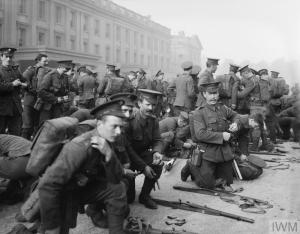
It makes me profoundly indignant whenever I read or hear it said that Great Britain went into the War for economic reasons. That is not true, and no one will ever forget the agony of those hours when England’s politicians seemed to be wavering, and when, as we have learned since, some of them actually did waver. There can be no possible question regarding the feeling of England as a whole. Her people cared nothing whatever for economic reasons. They were outraged at what had been done; they felt that Great Britain’s honor, and so their own, was in the balance, and when Germany’s proffered “bribe” to England was made known; when the people at large understood that their country had actually been offered a “price” if she would remain neutral, public indignation knew no bounds. When war was declared there was a universal cry: “Thank God we are in it! We can continue to look the world in the face.” Those of us who saw the men of the First Expeditionary Force march out, know better than to believe that they went for the sake of so cold an ideal as an economic reason. Besides which, we have been given too many accounts, by soldiers themselves, of their reasons for enlisting. Do we not remember (just to mention one) the story appearing first in an evening paper, about the London Scottish, “our Scottish” , one of the “crack” Territorial Regiments, whose intrepid and resolute stand at Messines on October 31st, won such widespread admiration, and which General Allenby (as he then was) spoke of as “worthy of the best traditions of British Regular Troops.” The story of the fight and its sequel has been retold by a young soldier who describes its effect on him before he had enlisted, saying that, as soon as he had read it, he hurried to the nearest recruiting office. It is an account of how a bare thousand men, alone and practically surrounded by “the cream of the Prussian Guard,” but obeying the orders of their Colonel, fought on until two-thirds of them were killed. Three times they reformed their thinning ranks, and the third time the Prussians broke and fled, and what was left of the London Scottish returned to their lines. But they had picked up a wounded German officer (only slightly wounded he was) and they brought him in on a stretcher with their own killed and wounded. “In those days,” so the tale continues, “(we have learned more since) we knew nothing of German Kultur. In those innocent, early days a wounded man was a wounded man, no matter what his creed, or his color, or his race. So our boys took the German and treated him as one of their own.” The doctor, in the greatness of his charity, and for the honor of the regiment, attended to him first, “while our own wounded and dying lay waiting…Gad, we were innocent, then! They had not even bothered to remove the Hun’s service revolver, which dangled from a strap at his side;” and as the doctor leaned over the wounded enemy, there was a flash and a sharp report, and the doctor fell dead, shot through by a German bullet. “That was the story that came from the hospital cot in Flanders,” this young soldier writes. “It was enough for me. I awoke. And when I got to the drill-hall there was no mistaking-the place, for from a block away you could see the crowd. A long, thin line of young fellows wound in and out of the crowd, each in the grip of that story of the night before. I took my place at the end of the line and waited. Hours passed. In the meantime the line strung itself far out into the street, for all over the country men had come swarming in…crystallized into a solid, fighting mass by the story of the Marne and the tale of the London Scottish.” Does that sound like an economic reason? When we remember the glorious Old Contemptibles as we saw them march away, have we no better monument to raise to them than that? For one of the most splendid memories which any of us can hope to keep untarnished is the air of serene detachment from all the lesser interests of life, the high-hearted equanimity with which they went. We have recently been reminded that the tradition of the British soldier is to “go out without a word.” That is at all times wholly British—it is true whether a matter of facing death or of facing irremediable loss, and what is true of the Army as a whole is therefore true of individual soldiers. I have always loved the story about Lord Roberts who, at his club one day, during the South African War, was reading aloud to others assembled in the room, the latest casualty list, just brought in. As he read of those killed in action, and as name after name went by, suddenly he came upon the name of his only son, the first intimation he had of his death, but when he came to it he read it out as clearly and steadily as he had the rest, without a shade of hesitation, finishing the list, which was a long one, in the same quiet voice, and when he had finished, with a little nod to his companions, he turned, erect and soldierly as always—and went out without a word. That was the spirit of the Old Contemptibles.
So we, still sitting at home in safety, watched our men go out, and read of the onrushing storm which they had gone to meet. In due course we were officially informed that the Expeditionary Force had been safely landed in France. Then casualty lists came pouring in, and as those fateful day? passed, one by one, and as they shaped themselves into weeks, it became more and more a matter of consuming importance to discover how one could make the best use even of one’s inefficiency. It was a simple matter for most men—the taking of an active part in the War. They could fight, thank God! They could fight with pucka rifle and bayonet, or with trench mortars or hand grenades or any other kind of weapon as the case might be. But with us who were women it was not so easy, not if you wanted to get into the thick of it, which of course most of us did, and I soon found that “ war work” under these conditions, did not drop into one’s lap. It was not a question of wanting to do the work; the question naturally was; “If we sent you to the front, what could you do? Are you a trained nurse? Can you drive an ambulance?” To both of these questions I, personally, was obliged to answer “No.” But I had made up my mind that I was going to get abroad, even though I seemed to be regarded as lacking in all the requirements necessary for foreign service, and I refused to look upon the situation as an impasse. So I did whatever work I appeared to be fitted for, and in leisure moments I continued my active service search. I used to ask: “If I join such and such a unit, do you think it will be sent abroad?” “We cannot promise you that,” was the usual answer, so I would turn away and go back to the rolling of bandages and the knitting of socks. At last I heard of a unit which was being organized by someone I knew, who told me, sub rosa, that she had every reason to hope that it would be sent to Belgium if its prospective members got certain First Aid Red Cross Certificates. The Red Cross classes had already started, but I got permission to join them, as a late comer, trusting to pass the examination when the time came. We all worked hard, attending lectures, at which we took copious notes; in the intervals bandaging unfortunate Boy Scouts, furnished us for the purpose; applying tourniquets until their poor little hands became quite black and swollen as a result of our inexperienced methods; trying every kind of First Aid experiment on them. We were very zealous in this work, and generally, by the time we had each got our Boy Scout’s arms and legs done up in splints for imaginary compound fracture; had enveloped his head in yards and yards of gauze; had tied up his jugular vein; had wound thick compresses over his chest (pneumonia of course); and had added an abdominal band as a final touch, what was still visible of the original Boy Scout was really not worth mentioning—a mouth or an ear or two, no more. Had those small Boy Scouts, issued to us by the Commissariat for our private consumption, not been young and tender, and therefore very innocent and long-suffering, there would have been open mutiny among them. They certainly did their “bit”! Yet after all our efforts; after the class had successfully graduated, we were told that the official forming of us into a unit would not be done “for the present.” No explanation. That settled it. “Bother units!” I said to myself, “I’m not going to sit here stuffily to be strangled by red tape. If I’m not careful the War will be over before I have so much as started, and efficient or inefficient, I’m going to get into it. I refuse to be organized. So I began to look about for an independent opening, and, of course, I found one almost immediately.[2]
SOURCES:
[1] “And now let us consider how the initial difficulty of fastening the interest on that which is unseen is to be overcome. Our gross senses refer only to that which is objective in the ordinary sense of the word; but just beyond this field of life there are finer sensations which appeal to finer senses. Here we find the first [clue] to the stepping stones we need. Man looks from this point of view like a point where many rays or lines center; and if he has the courage or the interest to detach himself from the simplest form of life, the point, and explore but a little way along these lines or rays, his whole being at once inevitably widens and expands, the man begins to grow in greatness. But it is evident, if we accept this illustration as a fairly true one, that the chief point of importance is to explore no more persistently on one line than another; else the result must be a deformity. We all know how powerful is the majesty and personal dignity of a forest tree which has had air enough to breathe, and room for its widening roots and inner vitality with which to accomplish its unceasing task. It obeys the perfect natural law of growth, and the peculiar awe it inspires arises from this fact.” [Collins, Mabel. Through The Gates of Gold. Roberts Brothers. Boston, Massachusetts. (1887): 59-60.]
[2] Volunteer (Dodge, Theodore.) “War Memories: It’s War.” The Theosophical Quarterly. Vol. XXVI, No. 3 (January 1929.): 210-222.


